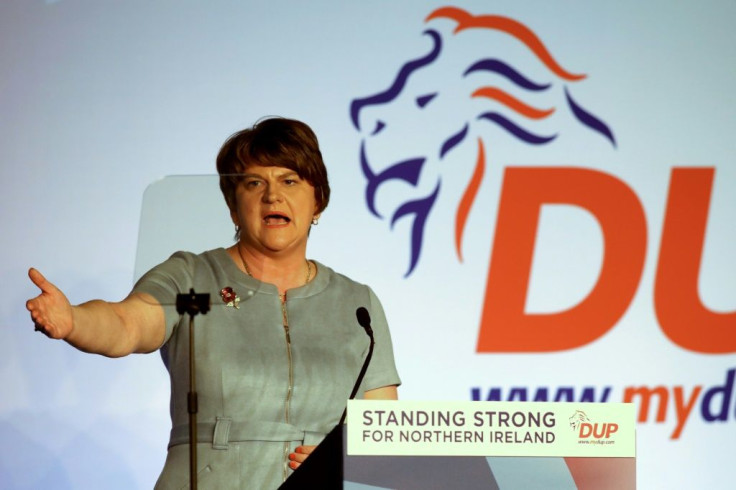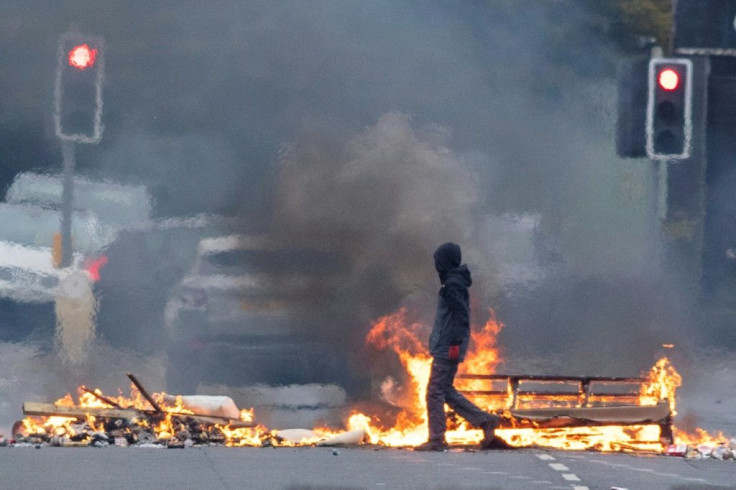N.Irish Leader Foster To Step Down After Losing Party Backing
Northern Ireland's First Minister Arlene Foster on Wednesday announced her resignation, after facing declining support and an internal party no-confidence vote, at a tense time in the divided British province.
The 50-year-old politician said she would quit as leader of the Democratic Unionist Party (DUP) on May 28 and as first minister at the end of June, calling it "the privilege of my life" to have served in the roles.
"I have sought to lead the party and Northern Ireland away from division and towards a better path," she said in a statement.
"As I prepare to depart the political stage it is my view that if Northern Ireland is to prosper then it will only do so built on the foundations of successful and durable devolution."
Her resignation comes amid a growing crisis for the DUP, the largest party of the Northern Irish unionist community.
Earlier this month the capital Belfast and other places saw more than a week of rioting -- with at least 88 police officers injured -- as pro-UK unionist anger at post-Brexit arrangements morphed with other issues to spark violence.
Foster opted to step down after reports that 75 percent of DUP lawmakers had signed a letter calling for a leadership contest.

Local media reported discontent over her decision to despatch a DUP member to a meeting with Irish officials, despite a party-wide belief that such summits should be boycotted over Brexit.
Rancour was also brewing among DUP lawmakers over her recent abstention from a vote on gay conversion therapy, the News Letter paper reported Tuesday.
Republican party Sinn Fein holds the office of deputy first minister under a power-sharing regime for Northern Ireland, founded when the three-decade sectarian conflict known as "The Troubles" wound down in 1998.
"The incoming DUP leader should recognise that the political landscape across our island has changed," said deputy first minister Michelle O'Neill.
"The broad community are impatient for social reform and political change which reflects a modern and progressive society where everyone can feel that they belong on an equal basis."
British Prime Minister Boris Johnson tweeted his thanks to Foster "for her dedication to the people of Northern Ireland over many years.
"I hope that she stays in public service for years to come," he added.

Irish prime minister Michael Martin sent his "best wishes" to Foster.
"As a person who has personal experience of the suffering that violence brings, Arlene knows more than most how difficult it is, but also how important it is, to work together for the peace and prosperity for all," he said.
Foster became DUP leader in December 2015 and first minister a month later, but her tenure has been pockmarked by moments of crisis in Northern Ireland and the wider UK.
The devolved power-sharing government in Belfast collapsed in January 2017 after a political scandal over a renewable heating scheme, and for three years the region was rudderless without executive leaders.
Meanwhile her party were unlikely power-brokers in Westminster between mid-2017 and late 2019 during Brexit-generated political gridlock there, and helped block ex-Prime Minister Theresa May's withdrawal plans, leading to her political demise.
When Foster was restored as Northern Irish first minister in January 2020, she faced difficulty reconciling new UK leader Johnson's strategy to deliver the country's departure from the European Union with her own unionist priorities.
Britain fully left the bloc's rules in January, with a special post-Brexit "protocol" for the province put in place which is now exacerbating tensions.
The new arrangements effectively keep Northern Ireland inside the EU customs union and single market for goods, with new checkpoints at Northern Irish ports trading with mainland Britain.
Many hardline unionists believe they are warping the position of Northern Ireland within the UK, increasing the likelihood of unification with the Republic of Ireland.
In her departure statement Foster said "the protocol being foisted upon Northern Ireland against the will of unionists has served to destabilise Northern Ireland."
But she also struck a more conciliatory note.
"There are people in Northern Ireland with a British identity, others are Irish, others are Northern Irish, others are a mixture of all three and some are new and emerging," she said.
"We must all learn to be generous to each other, live together and share this wonderful country."
© Copyright AFP {{Year}}. All rights reserved.





















